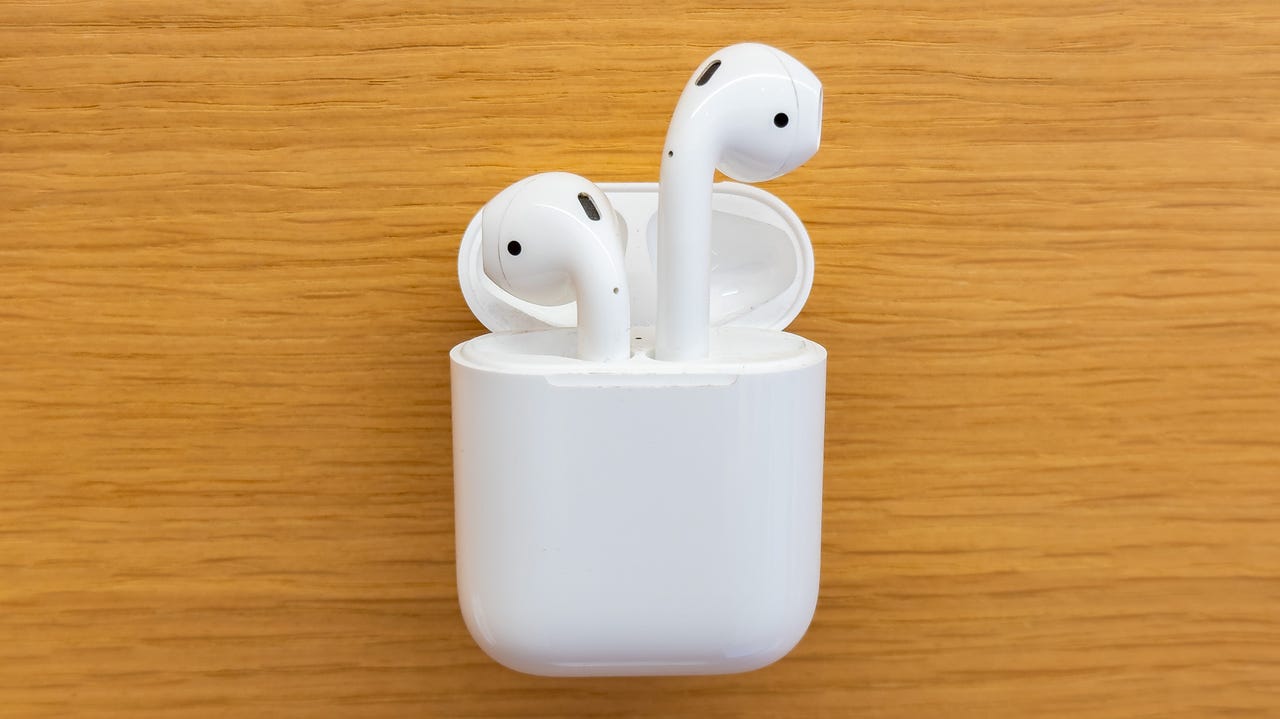
Apple’s second-generation AirPods turn five years old this week, and I’m proud to say that I’ve been using the same exact pair that I bought back in 2019. In tech terms, five years is an eternity.
Now, I know what you’re thinking. If your first concern after reading this is disgust (or a strange curiosity) I don’t blame you. There are a host of viral stories across the internet about people sprouting fungus in their ears (known as otomycosis), or getting ear infections from wearing earbuds “constantly”, that make the prospect of using the same pair for an extended amount of time seem like a bad idea.
Also: Two new AirPods models expected this fall – here’s everything we know so far
To which I say: don’t be gross. Clean your tech. Whether we’re talking about your phone, wearable devices, or AirPods, part of taking care of them is keeping them clean, which also goes a long way to their longevity and operation. I’ve kept mine clean and never once had any run-ins with fungus, microbes, or otherwise.
Notwithstanding submersion in mystery liquids, being crushed, stepped on, or dropped down sewer grates, these things are actually quite durable. The design of the AirPods is such that there are very few mechanical elements to “break down” solely by wear and tear.
In fact, many of the most commonly faced problems with the AirPods are related to “debris” getting stuck in sensitive ports, affecting charging or connections, all of which can be mitigated with regular tech hygiene.
Another tip for maximizing your AirPods longevity is keeping track of the actual earbuds. These things are small and slippery, and I try and only handle them if I’m not moving. Don’t try and multitask and pull them out of the case while going down stairs or walking in the street; they will inevitably fly out of your hands to somewhere they’ll be crushed, stepped on, or lost.
Also: Apple AirPods (2019) review: A subtle, but meaningful upgrade
Additionally, consider getting a case for a final layer of protection. For around $10, you can fortify your AirPods against the inevitable crushing it will face at the bottom of a backpack, or wedged in a seat cushion, as well as protect against moisture or impact damage from dropping the case.
The other side of this conversation is potentially much larger. With device manufacturers spurring consumers to buy, upgrade, and replace their products to an obsessive degree, holding onto the same “outdated” device for years at a time is almost an act of resistance.
Obviously, Apple wants me to upgrade my five-year-old AirPods with the latest AirPods 3. They’re better, of course: they have noise-canceling capabilities, they stay in place better, and have superior audio quality. These are objective facts about the technology, but does that render the older generation utterly obsolete, even if they still work?
The sheer amount of new devices available every year also raises concerns about sustainability. What do you do with your old tech once you’ve replaced it with the newer, more feature-rich version? Most people are aware that old tech can and should be recycled, but more often than not, many devices inevitably wind up in the trash.
The UN estimates that an average of 8kg of e-waste was produced per person in 2023, equating to around 61 million tons of electronic waste added to landfills around the world. Much of this belongs to what researchers call “invisible waste”, or garbage comprising a significant chunk of landfills but isn’t widely considered in conversations about sustainability. As you can imagine, discarded phones, computers, and electronic accessories make up a big portion of this.
And this number is only estimated to keep going up year after year.
Also: The best noise-canceling earbuds you can buy: Expert tested
I have a pair of over-ear headphones, and those serve their own purpose, but I haven’t had a need to buy new earbuds as long as my trusty AirPods keep working. And, well, they still do.
It’s safe to say Apple popularized the wireless earbud, and when the second-generation AirPods were released in 2019, they had far fewer competitors than they do today. Only Samsung’s Galaxy Buds matched the AirPods in terms of usability and features, and occupied the position opposite Apple as a product that was optimized for Samsung phones and by extension, Android.
Bottom line
Today, my AirPods not only still hold their own, but they’re part of the line of wireless earbuds that dominate the market share. The Apple H1 chip inside the second-generation model supports a fast connection speed for incoming calls and switching between devices, as well as Siri functionality, customizable tap commands, and commendable battery life.
Of course, there are way more earbuds on the market now, but there’s a reason why Apple’s second-generation AirPods remain top sellers during every major shopping season. For $100 (that’s around $70 less than the AirPods 3, by the way) you’re getting a pair of earbuds that not only sound great but are physically able to last if you take care of them, and I’m proof positive of that. Here’s to another five years, and possibly more.




















+ There are no comments
Add yours